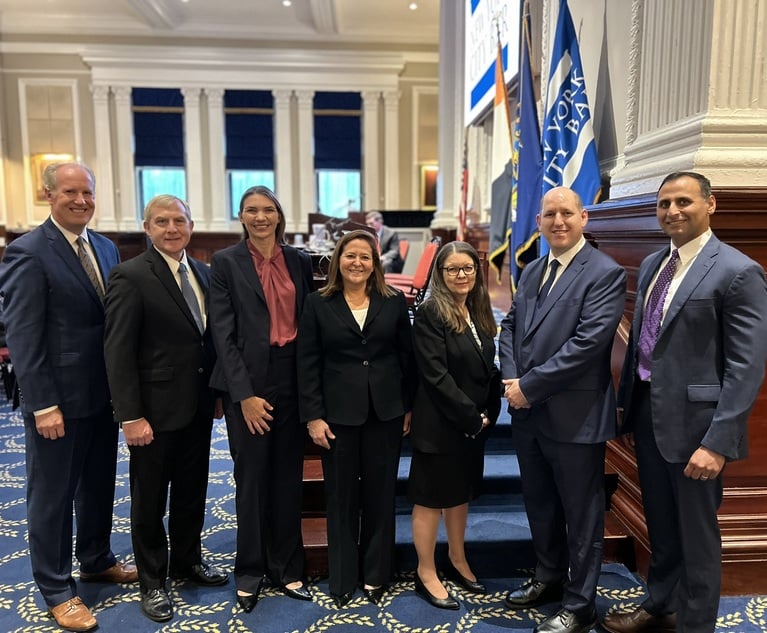Litigation Department of the Year, Insurance: Anderson Kill
Anderson Kill has always been a collegial firm in which young attorneys are accorded an unusual degree of responsibility, autonomy, and respect.
October 16, 2019 at 11:07 AM
3 minute read
 From left, Joshua Gold, shareholder and chair of cyber insurance recovery group; Finley Harckham, shareholder and chair of natural disaster recovery group; Rhonda Orin, managing partner, Washington, D.C. office; Robert Horkovich, managing shareholder (firm) and co-chair of insurance recovery group; Pamela Hans, managing shareholder, Philadelphia office; and William Passannante, shareholder and co-chair of insurance recovery group (Photo by David Handschuh/NYLJ)
From left, Joshua Gold, shareholder and chair of cyber insurance recovery group; Finley Harckham, shareholder and chair of natural disaster recovery group; Rhonda Orin, managing partner, Washington, D.C. office; Robert Horkovich, managing shareholder (firm) and co-chair of insurance recovery group; Pamela Hans, managing shareholder, Philadelphia office; and William Passannante, shareholder and co-chair of insurance recovery group (Photo by David Handschuh/NYLJ)
What are some of the department's most satisfying successes of the past year and why? We obtained decisions in trial and appellate courts that upheld vital allocation principles for policyholders seeking coverage for long-tail environmental and asbestos claims; clarified the limits of the pollution exclusion, e.g., that the exclusion applied only if the pollution was expected or intended by the policyholder, not by a successor; and rejected an insurance company's attempt to claw back defense costs already advanced. We also aided via amicus an important decision that found coverage under a crime policy for losses stemming from a phishing scam.
A prospective client in crisis calls and asks why your team should be retained. What is your answer? Anderson Kill's New York-based insurance recovery attorneys have recovered billions of dollars in judgments and settlements from insurance companies over the course of more than three decades and have made insurance law in multiple states. We continue to push the envelope, with consequential recent decisions concerning allocation, disgorgement, "direct loss" coverage defenses in cyber claims, and duty to defend.
We represent policyholders only in insurance coverage disputes, maintaining no ties to insurance companies and thus avoiding conflicts of interest. As pioneers in coverage litigation, we have a uniquely long institutional memory. Our practice is supported by a library of tens of thousands of insurance company regulatory filings, manuals, briefs, advertisements and other discovery materials.
What traits do you respect most in opposing firms and lawyers? Honesty, openness, and a minimum of gamesmanship.
What sorts of trends are you seeing in litigation, and what do you think will be the most important development in the law/legal business that will impact your field in the next 10 years? (1) In major environmental/asbestos litigation, battles now center over the allocation of these "long-tail" losses that span many coverage periods, covered by multiple insurance companies.
(2) In claims for data breaches and other cyber losses:
• A current battleground is insurance companies' "direct loss" defenses against coverage when fraud induces employees to wire money to fraudsters.
• In cases of state-sponsored crime and malice, we're starting to see "acts of war" exclusions invoked.
What is the firm doing to ensure that future generations of litigators are ready to take the helm? Anderson Kill has always been a collegial firm in which young attorneys are accorded an unusual degree of responsibility, autonomy, and respect. As a result, we have a steady stream of emerging young stars. We have an active mentoring program, a woman's network to help women advance their careers, and active minority outreach.
This content has been archived. It is available through our partners, LexisNexis® and Bloomberg Law.
To view this content, please continue to their sites.
Not a Lexis Subscriber?
Subscribe Now
Not a Bloomberg Law Subscriber?
Subscribe Now
NOT FOR REPRINT
© 2025 ALM Global, LLC, All Rights Reserved. Request academic re-use from www.copyright.com. All other uses, submit a request to [email protected]. For more information visit Asset & Logo Licensing.
You Might Like
View All
Elizabeth Cooper of Simpson Thacher on Building Teams in a 'Relationship Business'
4 minute read
For Paul Weiss, Progress Means 'Embracing the Uncomfortable Reality'
5 minute read
Kenneth Feinberg Had Dreams of Being on the Big Screen. His 9/11 Victims Fund Gave Him an Unexpected Star Turn

City Bar Holds 32nd Annual Henry L. Stimson Medal Presentation
Trending Stories
- 1Gunderson Dettmer Opens Atlanta Office With 3 Partners From Morris Manning
- 2Decision of the Day: Court Holds Accident with Post Driver Was 'Bizarre Occurrence,' Dismisses Action Brought Under Labor Law §240
- 3Judge Recommends Disbarment for Attorney Who Plotted to Hack Judge's Email, Phone
- 4Two Wilkinson Stekloff Associates Among Victims of DC Plane Crash
- 5Two More Victims Alleged in New Sean Combs Sex Trafficking Indictment
Who Got The Work
J. Brugh Lower of Gibbons has entered an appearance for industrial equipment supplier Devco Corporation in a pending trademark infringement lawsuit. The suit, accusing the defendant of selling knock-off Graco products, was filed Dec. 18 in New Jersey District Court by Rivkin Radler on behalf of Graco Inc. and Graco Minnesota. The case, assigned to U.S. District Judge Zahid N. Quraishi, is 3:24-cv-11294, Graco Inc. et al v. Devco Corporation.
Who Got The Work
Rebecca Maller-Stein and Kent A. Yalowitz of Arnold & Porter Kaye Scholer have entered their appearances for Hanaco Venture Capital and its executives, Lior Prosor and David Frankel, in a pending securities lawsuit. The action, filed on Dec. 24 in New York Southern District Court by Zell, Aron & Co. on behalf of Goldeneye Advisors, accuses the defendants of negligently and fraudulently managing the plaintiff's $1 million investment. The case, assigned to U.S. District Judge Vernon S. Broderick, is 1:24-cv-09918, Goldeneye Advisors, LLC v. Hanaco Venture Capital, Ltd. et al.
Who Got The Work
Attorneys from A&O Shearman has stepped in as defense counsel for Toronto-Dominion Bank and other defendants in a pending securities class action. The suit, filed Dec. 11 in New York Southern District Court by Bleichmar Fonti & Auld, accuses the defendants of concealing the bank's 'pervasive' deficiencies in regards to its compliance with the Bank Secrecy Act and the quality of its anti-money laundering controls. The case, assigned to U.S. District Judge Arun Subramanian, is 1:24-cv-09445, Gonzalez v. The Toronto-Dominion Bank et al.
Who Got The Work
Crown Castle International, a Pennsylvania company providing shared communications infrastructure, has turned to Luke D. Wolf of Gordon Rees Scully Mansukhani to fend off a pending breach-of-contract lawsuit. The court action, filed Nov. 25 in Michigan Eastern District Court by Hooper Hathaway PC on behalf of The Town Residences LLC, accuses Crown Castle of failing to transfer approximately $30,000 in utility payments from T-Mobile in breach of a roof-top lease and assignment agreement. The case, assigned to U.S. District Judge Susan K. Declercq, is 2:24-cv-13131, The Town Residences LLC v. T-Mobile US, Inc. et al.
Who Got The Work
Wilfred P. Coronato and Daniel M. Schwartz of McCarter & English have stepped in as defense counsel to Electrolux Home Products Inc. in a pending product liability lawsuit. The court action, filed Nov. 26 in New York Eastern District Court by Poulos Lopiccolo PC and Nagel Rice LLP on behalf of David Stern, alleges that the defendant's refrigerators’ drawers and shelving repeatedly break and fall apart within months after purchase. The case, assigned to U.S. District Judge Joan M. Azrack, is 2:24-cv-08204, Stern v. Electrolux Home Products, Inc.
Featured Firms
Law Offices of Gary Martin Hays & Associates, P.C.
(470) 294-1674
Law Offices of Mark E. Salomone
(857) 444-6468
Smith & Hassler
(713) 739-1250






